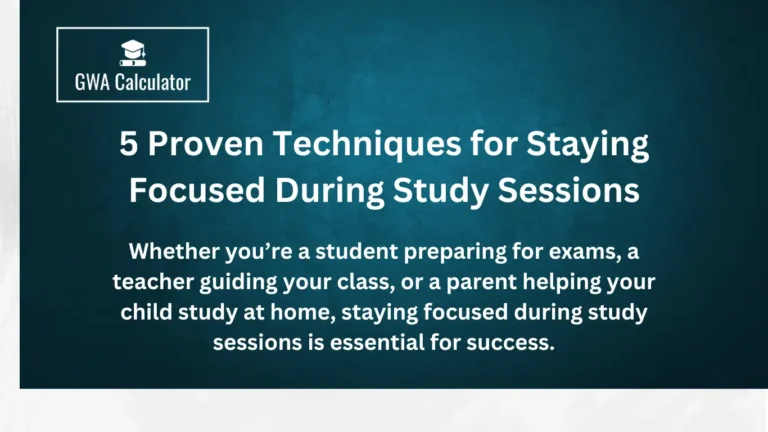How to Study Smart, Not Hard: Tips for High GPA with Less Stress
Achieving a high GPA without succumbing to stress might seem like an impossible feat, but with the right strategies, you can make studying both efficient and effective. In this guide, we’ll explore practical tips to help you study smarter—not harder—so you can excel academically while maintaining a healthy balance in life.
Why Studying Smart Matters
Many students believe that long hours of studying equate to better grades. However, research shows that quality trumps quantity when it comes to learning. Studying smartly allows you to focus on the most important material, retain information effectively, and reduce burnout. By leveraging proven techniques, you can maximize productivity and free up time for other activities.
1. Understand Your Learning Style
Everyone learns differently, so understanding your learning style is key to effective studying. There are three primary learning styles:
- Visual Learners: Prefer charts, diagrams, and visual aids.
- Auditory Learners: Retain information better through listening.
- Kinesthetic Learners: Learn best through hands-on activities.
Tip: Take a learning style quiz online to identify what works best for you and tailor your study sessions accordingly.
2. Set Specific Goals
Vague objectives like “study for math” aren’t helpful. Instead, set specific, measurable goals for each session, such as “review chapters 3 and 4 and solve 10 practice problems.”
SMART Goals Framework
- Specific: What exactly do you want to accomplish?
- Measurable: How will you track progress?
- Achievable: Is the goal realistic?
- Relevant: Does it align with your academic needs?
- Time-bound: When will you complete it?
You can check you GWA online by using Our GWA Calculator
3. Prioritize Active Learning
Passive methods like re-reading notes or highlighting text are less effective than active learning techniques. Engage with the material through:
- Practice Tests: Simulate exam conditions to identify weak areas.
- Teaching Others: Explaining concepts to someone else helps solidify your understanding.
- Flashcards: Test your recall of key terms and concepts.
Example: Use spaced repetition apps like Anki to optimize flashcard reviews.
4. Break Study Sessions into Chunks
The human brain is wired to focus best in short bursts. The Pomodoro Technique is a popular method:
- Study for 25 minutes.
- Take a 5-minute break.
- Repeat four times, then take a longer 15-30 minute break.
Benefits
- Increases focus and reduces procrastination.
- Prevents mental fatigue.
5. Create an Optimal Study Environment
Your study environment can significantly impact productivity. Eliminate distractions and make the space conducive to concentration.
Key Elements
- Lighting: Ensure good lighting to reduce eye strain.
- Comfortable Seating: Avoid overly cozy spots like your bed.
- Noise Control: Use noise-canceling headphones or white noise apps if needed.
Tip: Keep essentials like water, pens, and a notebook within reach to avoid interruptions.
6. Use Technology Wisely
Leverage technology to enhance your study efficiency. However, avoid getting sidetracked by social media or unrelated apps.
Recommended Tools
- Note-taking Apps: Evernote, Notion
- Mind Mapping Tools: MindMeister, XMind
- Study Apps: Quizlet, Khan Academy
Tip: Turn off notifications or use focus mode on your device while studying.
7. Focus on Understanding, Not Memorizing
Cramming might help you pass a test, but it doesn’t lead to long-term retention. Aim to understand the underlying concepts so you can apply them in different contexts.
Strategies
- Relate new information to things you already know.
- Ask “why” and “how” questions to deepen comprehension.
- Summarize concepts in your own words.
8. Stay Physically and Mentally Healthy
Your brain functions best when you take care of your overall well-being. Neglecting your health can diminish your academic performance.
Tips
- Sleep: Aim for 7-9 hours of quality sleep each night.
- Exercise: Incorporate at least 30 minutes of physical activity daily.
- Nutrition: Eat brain-boosting foods like nuts, berries, and fish.
9. Review Regularly
Don’t wait until the last minute to review material. Regular revision strengthens memory and reinforces learning.
Strategies
- Review notes at the end of each day.
- Schedule weekly recap sessions.
- Use mind maps to visualize connections between topics.
10. Seek Help When Needed
If you’re struggling with a subject, don’t hesitate to seek help. Reach out to teachers, classmates, or tutors for clarification.
Resources
- Join study groups for collaborative learning.
- Use online forums like Reddit or Stack Exchange for specific queries.
- Attend office hours or extra classes offered by your instructor.
Conclusion
Studying smart is about making the most of your time and effort to achieve academic success without overwhelming stress. By understanding your learning style, setting clear goals, and adopting effective study strategies, you can excel in your studies while maintaining balance in your life. Remember, consistency and self-care are just as important as hard work.
Start implementing these tips today and see the difference they make in your academic journey. Happy studying!







